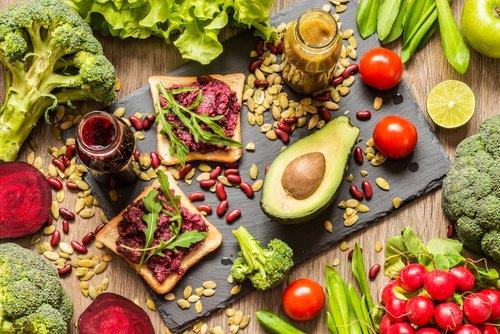Veganism has changed from being a health trend to a personal commitment to improving one’s lifestyle.
The International Vegetarian Union defines veganism in two ways. First, it is a way of living to exclude all forms of cruelty and exploitation of all animals as sources of food and clothing. The other definition is that it is a dietary practice of completely staying away from animal produce like meat, fish, poultry, animal milk, and its derivatives.
Switching to a vegan lifestyle entails a lot of proper planning, hard work, motivation, and discipline. Your body should both be prepared physically and mentally before moving to a plant-based diet. Becoming vegan also means there are a lot of restrictions when it comes to eating out, but it’s not a difficult road with the right preparations.
Here are some helpful tips if you want to make the switch but don’t want to limit socializing with your family, friends, and colleagues:
1. Research and collect facts
The first step here is you have to know by heart the basics of veganism, the benefits of a plant-based diet, and the ways on how to live a sustainable vegan lifestyle. Research first on what you’re getting into before entirely deciding to go for it. Identify your main reason why you want to become a vegan, and from there build a good foundation and plan appropriately on how to change your lifestyle.
The next step is to be well adept of the food that you are allowed to eat. Having broad knowledge of what to use as protein sources like milk, cheese and others; helps in slowly sinking veganism into your system, and your brain will unconsciously adapt to the change. You also need to know where to buy your grocery and where to get vegan products. Here are some of the ways to do that:
● A good idea is to have contacts with local growers in your community and ask them if they can supply you with a weekly harvest of their fruits or vegetables.
● You can also avail of food delivery services that supply vegan meals and snacks to offices such as SnackNation. This kind of services is very helpful and convenient for people who want to maintain a healthy lifestyle but don’t have time to prepare their own food.
● You can also go to weekend markets where local farmers sell fresh produce.
● You might be worried about your protein source. There are a lot of plant protein sources such as soy, beans, quinoa, tofu, etc.
● There are also vegan protein powders that you can incorporate into your shakes and juices.
Like any lifestyle choices, switching to veganism requires dedication most especially if you are used to consuming a lot of meat. Do a lot of research, read blogs and books, and communicate with other vegans to know their experiences, tips, and tricks. The research part does not stop in the planning stage but throughout the whole process so you can consistently practice veganism with ease.
2. Establish your reasons for veganism
Establishing your reasons for veganism can help you stay on the path while maintaining a good relationship with others around you.One major aspect of veganism is about the plant based diet. Another aspect of veganism is also about respect and practicing ethics of not using animals and any derivatives as sources for food and clothing and even subjects for experimental purposes. There are a lot of reasons why people decide to become vegans. Some of the reasons are:
● Animal welfare issues concerning the slaughter of animals for human consumption
● Issues on environmental impact associated with increased carbon footprint because of animal farming like air, land, and water pollution because of animal wastes produced, and the use of resources, such as fossil fuels, in the practice
● Addressing the problem of world hunger by promoting plant sources as efficient food sources
Some practitioners have sworn to the benefits of switching to this lifestyle, but some would oppose that there is no better protein source than meat. If you want to become a vegan and maintain good relationships, then you should get a firm grip on your reasons and don’t get dismayed or discouraged when other people don’t share your point of view.
3. Make a gradual shift
Going vegan is not an overnight success, but it’s not hard. One common mistake of anyone who is trying to go on the vegan lifestyle is that they set a day when to start their journey to good health. The drawback of this strategy is that there is a high probability of failing in the first few weeks because the body was not able to adapt slowly to the change in food intake. To avoid this from happening, you can do the following:
● Gradually introduce the vegan diet to your daily routine by first doing a no-meat day once or twice a week and then increasing the number of days of going vegan in the succeeding weeks.
● On the days that you allow yourself to eat meat, go ahead and hang out with your buddies; but you don’t need to worry about the days you don’t eat meat since there are a lot of vegan meals available in restaurants..
● Another way of slowly transitioning to veganism is to start snacking with only fruits, vegetables, and vegan products.
● Prepare your snacks before you go out of your home and bring them whether you’re at school or work. Some healthy snacks options are apple slices, oranges, peaches, and celery sticks.
4. Get Involved in Vegan Communities
It’s always nice to talk to people who understand you and have the same interests as you. After all, becoming a vegan is a lifestyle choice. Having the right support system that will help you achieve your goals and sustain a vegan lifestyle is essential to a successful transition to being a vegan. You don’t need to move and find another place to live. You can do any of the following:
● Connect with other fellow vegans through social media or join blogs and forum discussions
● Participate in local meet-ups
For new vegans, this is a very useful tip so that you will learn a few tips in veganism. Your questions such as what are some vegan restaurants in your area, where to shop for vegan products, and how many servings of protein should you eat daily can be addressed by other practitioners who are more than willing to help you.
5. Be an advocate of non-food vegan products
If you want to take your switch to the next level, you can also try embracing the whole vegan lifestyle. You might be thinking that veganism is mostly about plant-based diet, but it also an advocacy in fostering compassion and respect for animals and mother nature. Vegan products are not only limited to food products but also include clothing and cosmetics.
Here’s what you can do:
● Consciously choose to buy cosmetics such as makeup and facial oils that are vegan and cruelty-free
● Buying winter clothes with animal fur is a big no-no
● Choose vegan leather, organic materials, and knitted fabrics
● Promote the use of products that are eco-friendly, ethically made, and not tested on animals
This option of choosing to buy non-vegan and organic products reduces the build-up of harmful and chemically toxic wastes in the environment. This results in regulating and preventing pollution in lands and bodies of water. This particular aspect of veganism has not been limited to vegans but also to other people that do not practice the vegan lifestyle.
Veganism opened up new perspective in the society. It has moved up to be a social responsibility in raising environmental awareness more than the need to conform to the said lifestyle.
5. Go for sustainable living
When you’re switching, it’s important you learn to make your own food. One great practice is planting your vegetables. Because one of the main reasons of veganism is self-sufficiency in food sources, vegan practitioners are starting to grow their food in their garden. The following are the benefits of growing your own food:
● You’ll have easy access to fresh fruits and vegetables
● You can buy fewer ingredients from the grocery store and save some money
● If you have a bountiful harvest and there is enough supply for the entire household, you can either give your produce to your fellow vegans or join weekend markets where you can sell your products. Through this, you can make money and new friends, too.
You can also effectively reduce waste by removing non-edible parts of fruits or vegetables and turning them into compost. This can be turned into an organic fertilizer that you can use in your garden.

6. Be creative
Now that you’ve done your research, it’s time to go to your kitchen and do some serious meal preparation. Meal preparation can be boring and tedious especially if you do not know how to spice up your food and create alternatives. Being creative means modifying your favorite dishes to be meatless or vegan friendly.
You can experiment by cooking your favorite homemade recipe and using tofu or mushrooms as a meat replacement. There are many video tutorials online about vegan cooking that you can watch and learn from. Make sure that you prepare your meal yourself as this is a good way to learn the use of certain vegan products in a wide variety of dishes.
7. Explore other vegan options and alternatives
Another great way when making the switch but maintaining your social life is to ask your friends and go for a culinary adventure. Set a date and ask them to try a new Indian or a Greek restaurant. Trying out international culinary dishes will widen your palate and will give you an idea on how you can prepare recipes that are vegan friendly.
Some culinary dishes from around the world are kimchi, soba noodles, mandu, tempeh, baba ganoush, and hummus, which are all vegan. Exposing yourself in other culinary flavors will make your vegan meal planning easier as there are a lot of ingredients that can be used as alternatives.
8. Share your advocacy with others
When you’re having reunions or small family gatherings, whip up your favorite vegan recipe and share it with them. Let them know that vegan food is not just healthy but delicious, too. As a part of the veganism advocacy, it is your social responsibility as well to properly disseminate information to others that vegan is not just about the food but more of a lifestyle that makes you kinder to the world.
Final Thoughts
The hardest part of it is starting, but once you have the right mindset and motivation, the rest will come easy. Like any other lifestyle change, becoming a vegan will affect a lot of areas in your everyday life, but planning it properly, sticking to it, and never giving up will make your new lifestyle more sustainable in the long term.
With determination and proper support system from people with the same advocacy, switching to vegan will be easy and enjoyable. It is truly more than a diet, but a lifestyle change since it will open up a new perspective and appreciation in your way of living. It is a way to be more respectful and empathetic in the world you are living in.








0 comments